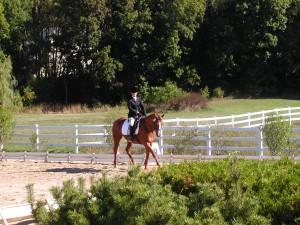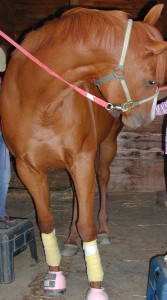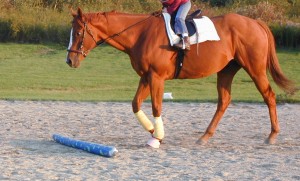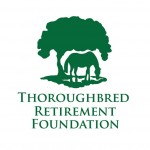Tentative at first, a child lifts a hand to touch the velvet muzzle of the shiny chestnut Thoroughbred.
The horse lowers his mighty head pushing his soft nose into the outstretched hand. Reassuring the child he answers the unasked question: Yes, I will help.
To a child diagnosed and suffering with depression, anxiety, or other special circumstances, life can often be difficult and dark. But for a lucky few who find their way to an innovative horse-therapy program offered at Newington, N.H. riding stable Wild Irish Farm, life becomes somehow better when they get to take riding lessons on a patient ex-racehorse.
Sherborn raced briefly at Suffolk Downs managing to pull off a single win before he was retired. Laura Peterson bought him for a dollar eight years ago from a friend, and rehabbed him from a bone chip and abscess in a hoof.
Race name: Sherborn
Barn name: Bounce
Sire: Ide
Dam: Toyaholic
Foal date: March 22, 1999 It wasn’t clear at the beginning that Sherborn would make a perfect lesson horse for children of all ages, or that he would be an ideal partner for Peterson’s equine facilitated psychotherapy program.
At first he was just Peterson’s riding horse who she started in dressage. And for a time, the pair competed in low-level dressage, and did quite well.
“We had four or five years when we were competing steadily and we were winning everything!”
But when bursitis was discovered in Sherborn’s shoulder two years ago, she eased up on the competition and decided that lighter work might be more suitable.
Sherborn blossomed when he started working with children taking regular riding lessons, showing a particular fondness for quiet, low-key children.
Peterson had been offering equine therapy sessions, and also teaching regular riding lessons to many young clients, when it became clear that the horse was also perfect for children with special needs.
“He’s one of the smartest horses I have on the farm—I know that’s an attribute of Thoroughbreds,” Peterson says. “I think his intelligence, combined with his laid-back personality, plays a huge role in his ability to work with the kids.
“He’s especially interested in kids who take the time to get to know him, and out in the paddock he’ll approach and introduce himself!”
So when that little girl or boy finds Sherborn, kindly waiting to make friends, he appears like a gleaming ray of hope.
“When kids come to participate in equine facilitated psychotherapy, the horses help make their sessions something fun,” Peterson says.
“They’re thrilled to get to work with a horse, rather than sit in a therapist’s office and talk.”
Instead, equine therapy riders will sink their hands into the warmth of the horse, brushing them, touching them, and learning to listen and feel. They learn to be quiet around the animals, and in the saddle quickly realize that their every action brings about immediate response and reactions—just as in human relationships.
“Riding reveals a child’s behavior right away,” Peterson says. “The simple task of asking the horse to stop is a lesson that requires a child to be assertive. The child learns immediately to adjust his or her patterns to get the desired effect.”
Or for example, if they have to pull on the reins harder to get the horse to do something, I might ask: ‘Do your parents have to do that with you to get you do something?’ ”
And as the child learns to work with a 1,200-pound animal, so they are also inspired to reflect on how a lesson with Sherborn repeats in their daily lives.
In Peterson’s program, the children develop and improve their social skills by interacting with the horse.
“Horses are unbiased and don’t hold grudges,” she says on her website. “Children learn to read the horse’s body language and adjust their behavior accordingly. Often, horses act like a mirror, reflecting the feelings of a rider.”
An angry rider, she explains, brings out the stubborn side of Sherborn. But a student who moves through their frustration soon finds Sherborn more eager to engage and willing to move on.
The decision to use her off-track Thoroughbred for equine therapy students as well as other riding clientele came after she spent years getting to know her ex-racehorse in a variety of settings, and developing her own foundation with teaching children.
Peterson worked in several equine therapy programs, including one in Maine and one in the Berkshires. And she holds a master’s in social work from the University of New Hampshire and a bachelor’s in sociology from the College of Charlston.
Her history riding, learning, and teaching combines perfectly when she enters the lesson ring with an OTTB who seems made to teach children of all levels. Whether kids are there for therapy, or a regular riding lesson, Sherborn’s straightforward personality speaks heart to the heart.
Says Peterson “He not afraid to let kids know when they are doing something he doesn’t like— not aggressively; but, he’s very expressive with his nonverbal cues. He is very engaged in the process of forming relationships and seems to be more than happy to express what works and doesn’t work for him.
“A very healthy thing in any relationship!”





What a beautiful story about a great team as usual!
Thank you Cynthia! I hadn’t heard of an OTTB as therapy horse, so it seemed pretty special.